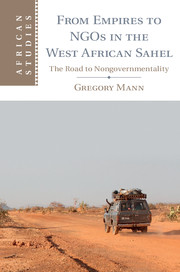6 - Human Rights and Saharan Prisons
Published online by Cambridge University Press: 05 January 2015
Summary
The introduction asked whether the domestication of human rights should be counted as one of Africa’s triumphs, or if the conquest of Africa is a triumph for human rights. This chapter seeks preliminary answers to these questions among a clutch of Malian political prisoners of the 1970s and the international campaigns of human rights and solidarity generated around them. It scrutinizes two strands of an evolving postcolonial politics: one based in solidarities formed around shared political principles and experiences in Communist study groups, labor unions, and anticolonial parties; the other grounded in the hybrid set of Enlightenment ideals and contemporary tactics known as human rights. It asks what kinds of power lay behind the defense of the powerless in the Sahara and the Sahel.
In the post-Cold War period, human rights became “the dominant moral narrative by which world politics was organized.” The decade between the end of the Cold War and the global war that followed September 11, 2001 also marked the “golden years – or at least the boom decade – of nongovernmental politics.” West Africa had its place in that parade. As one wave in what appeared to be a rising tide of democratization – marked by the overthrow of Moussa Traore in 1991 and the establishment of the Third Republic the following year– Mali became a darling of the international community and a “good student” of the Bretton Woods institutions. The New York Times hailed the country as “an example of what the struggling African continent can become.” The country’s independent press seemed to thrive, feeding largely on calls for proposals, contracts, and employment opportunities that major funders such as US-AID placed within its pages. Private radio stations mushroomed as well, sometimes with grants from the same AID or from the Fédération Européenne des Radios Libres, but thanks also to funding sources that were much less apparent. The transformations taking place in the Sahelian countries, of which Mali provides perhaps the most dramatic example, were not unique to that region of the continent. Political decentralization, the selling off of state enterprises, and the rapid expansion of civil society took place across Africa.
- Type
- Chapter
- Information
- From Empires to NGOs in the West African SahelThe Road to Nongovernmentality, pp. 209 - 242Publisher: Cambridge University PressPrint publication year: 2014
References
- 1
- Cited by



